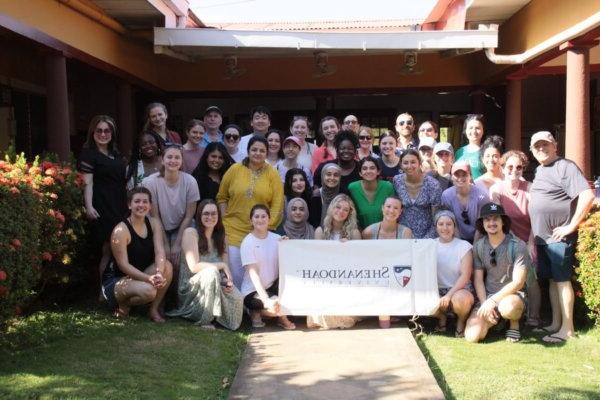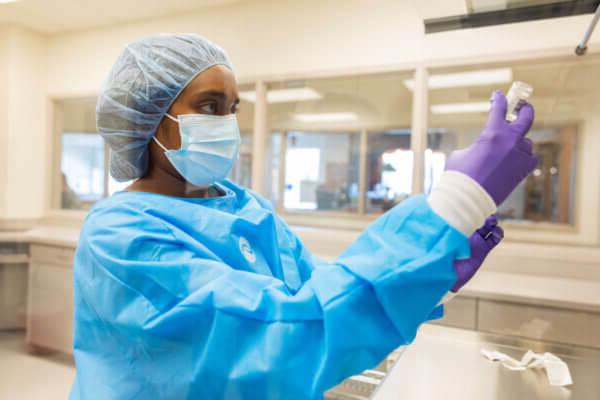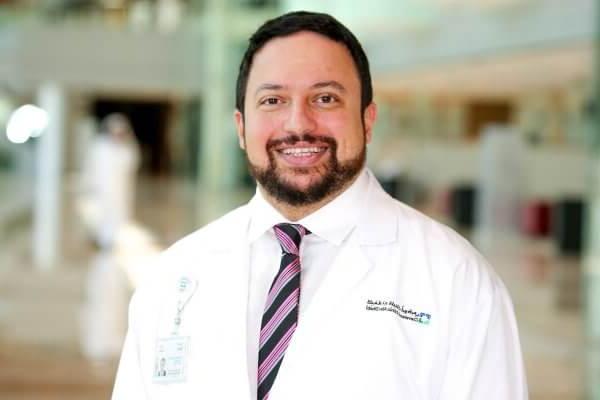Advanced education to succeed in the rapidly changing healthcare system
The dual degree program prepares students to enter a wide range of pharmacy positions that address some of today’s most challenging health care issues. Shenandoah University and Inova have partnered to offer a master’s degree in Pharmacogenomics and Personalized Medicine (PGPM) for students in the Bernard J. Dunn Doctor of Pharmacy (Pharm.D.) Program interested in exploring this fascinating field of study and applying knowledge of the human genome to clinical practice. This unique degree combination prepares students for career opportunities clinical practice, biotechnology, genetic testing or in the pharmaceutical industry. It also provides students with the skill set needed to pursue specialized fields in healthcare that are poised for growth.
The M.S. in PGPM degree program provides the opportunity for students to explore the relationship between an individual’s genetic make-up, their health and their response to medications. Pharmacogenomics focuses on the use of genomic information to develop the most effective use of medications, including minimizing adverse events. Personalized medicine is a method of disease prevention and treatment for which the healthcare team considers individual variations in genes, environment and lifestyle. Students will become familiar with the most widely used genomic laboratory techniques and interpretation of pharmacogenomics data used in personalizing drug therapy. Introductory concepts of genomic data science will also be introduced in a hands-on format. Additionally, students will complete a research project in pharmacogenomics and/or personalized medicine in their final year in the program.
Both the Pharm.D. and PGPM programs integrate graduate-level critical thinking, problem-solving and scientific inquiry. Graduates will gain knowledge and experience in self-directed learning, the effective use of modern technology in the laboratory and clinical setting and develop research, leadership, and education skills to contribute to the fields of pharmacy and personalized medicine. The dual program offers individuals interested in pursuing degrees in both pharmacy and pharmacogenomics a unique opportunity to complete both programs simultaneously, saving time and money.
The Pharm.D./M.S. in PGPM program is designed for students who are presently enrolled in pharmacy school.
Please contact PGxMasters@bongobaystudios.com with any questions about the program or to apply.
Program of Study
- Genetic Foundations of Personalized Medicine
- Essentials of Pharmacogenomics
- Pharmacology
- Pharmacokinetic Principles
- Applied Pharmacokinetics and Pharmacogenomics I
- Applied Pharmacokinetics and Pharmacogenomics II
- Applied Pharmacokinetics and Pharmacogenomics III
- Genomic Technology and Data Science
- Clinical Applications Pharmacogenomics
- Pharmacogenomics Literature Evaluation
- Analytical Techniques – Pharmacogenomics
- Ethics in Genomic Science
- Therapeutic Antibodies
- Epigenetics
- Project in Pharmacogenomics and Personalized Medicine
Meet the Faculty
The Bernard J. Dunn School of Pharmacy recruits faculty who are accomplished teachers, researchers, and clinicians.
During your first semester of the Pharm.D. program, you’ll partner with your own faculty adviser who will provide you with guidance for the duration of the program. You’ll enjoy close relationships with faculty who are caring, accessible and dedicated to preparing you for your role as pharmacist. While our faculty is actively engaged in research and scholarship, your education remains their number one priority.
Upon acceptance to the dual degree program, the Pharmacogenomics and Personalized Medicine Program Director will become a second advisor, focusing on your MS degree
Application Information
The M.S. in PGPM provides students with the skill set needed to pursue specialized fields in healthcare and research that are poised for growth. Start your application today!
Applications are open to full-time, traditional pathway, second professional year Pharm.D. students at the Bernard J. Dunn School of Pharmacy.
Please contact PGxMasters@bongobaystudios.com with any questions about the program or to apply.
Pharmacy Application Information
Frequently Asked Questions (FAQs)
When will I be notified of acceptance to the Pharm.D./M.S. in Pharmacogenomics and Personalized Medicine Program?
Applications are reviewed after the application close date. Notices of acceptance are typically made within one month of the application close date.
How many students admitted per year to the Pharm.D./M.S. in Pharmacogenomics and Personalized Medicine Program?
The number of students admitted depends on the number of qualified applicants. This program has a capacity of ten students per year.
Is the Pharm.D./M.S. in Pharmacogenomics and Personalized Medicine Program a full-time or part-time program?
The dual degree program is a full-time Pharm.D. program integrated with a part-time master’s program. During Fall and Spring Terms students will take a full-time credit load as part of their Pharm.D. and over the summers and during their fourth year students will take a part-time credit load as part of the M.S. in Pharmacogenomics and Personalized Medicine Program.
Is the Pharm.D./M.S. in Pharmacogenomics and Personalized Medicine Program an online or in-person program?
The Pharm.D. course requirements are an in-person program offered on either the Winchester or Fairfax campuses. The M.S. in Pharmacogenomics and Personalized Medicine coursework is offered as an online program. The research component of this program may be completed online or in-person, depending on the project and research adviser.
Is a bachelor’s degree required for the dual-degree program?
No, but the most competitive applicants have a strong pre-pharmacy background in genetics, biochemistry, and molecular and/or cell biology, which often comes with a B.S. or B.A. degree.
Do I have to be a Bernard J. Dunn School of Pharmacy Pharm.D. student to apply to the Pharm.D./M.S. in Pharmacogenomics and Personalized Medicine dual-degree program?
Yes, the dual-degree program is designed to integrate into the Bernard J. Dunn School of Pharmacy traditional Pharm.D. pathway. A dual-degree option is not offered with the nontraditional Pharm.D. pathway. Nontraditional Bernard J. Dunn School of Pharmacy Pharm.D. graduates are welcome to apply to the M.S. in Pharmacogenomics and Personalized Medicine Program.
Do I have to be a P2 student to apply to the Pharm.D./M.S. in Pharmacogenomics and Personalized Medicine dual-degree Program?
Yes, the dual-degree program is sequenced to start the summer between P2 and P3 years in order to finish both degrees at the end of the P4 year. First year students are encouraged to attend the fall information session to learn more about the Pharm.D./M.S. in Pharmacogenomics and Personalized Medicine dual-degree program. Third- and fourth-year students are encouraged to investigate the Graduate Certificate in Pharmacogenomics program and M.S. in Pharmacogenomics and Personalized Medicine Program that can be completed after earning their Pharm.D.
Is there a tuition discount for dual-degree students?
The per credit cost for the M.S. program is slightly lower than the per credit cost in the Pharm.D. program. In addition, two of the Pharm.D. elective slots can be filled with PGPM courses, resulting in a cost savings as you complete the two degrees in parallel.
Do I earn my Pharm.D. and M.S. at the same time?
If you complete all requirements on schedule, dual-degree students are conferred both degrees at the University’s May Commencement ceremony.
Is a thesis required for this program?
Written and oral communication is in demand in the field. While there is no formal thesis, all students will engage in a research project culminating in a written and/or oral presentation on a topic of their choosing. This could be based on laboratory work, case reviews, computational work, or a combination of various aspects covered in the program.
What can I do with this degree?
This degree positions students for career opportunities in clinical pharmacogenomics, biotechnology, genetic testing, and in the pharmaceutical industry. Residencies and fellowships are often prerequisites for some of these opportunities. Students with advanced education in these areas may be at a competitive advantage in securing one of these positions.




